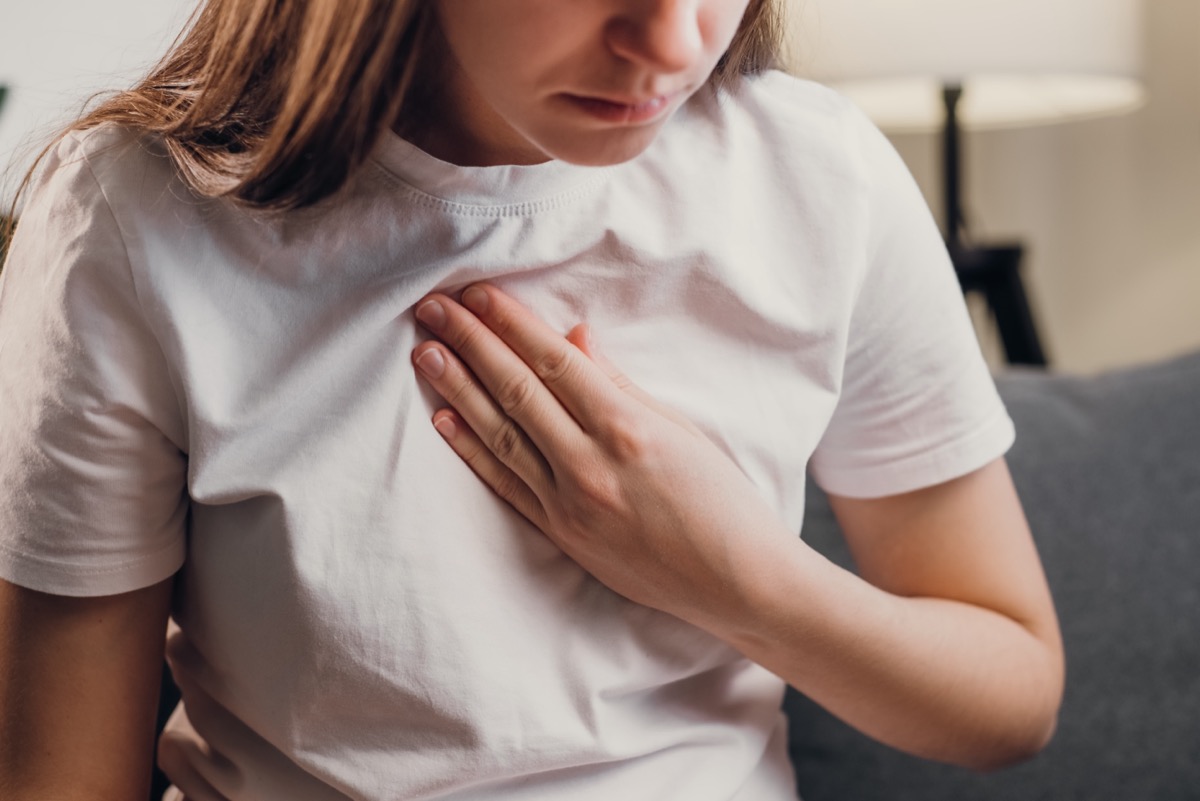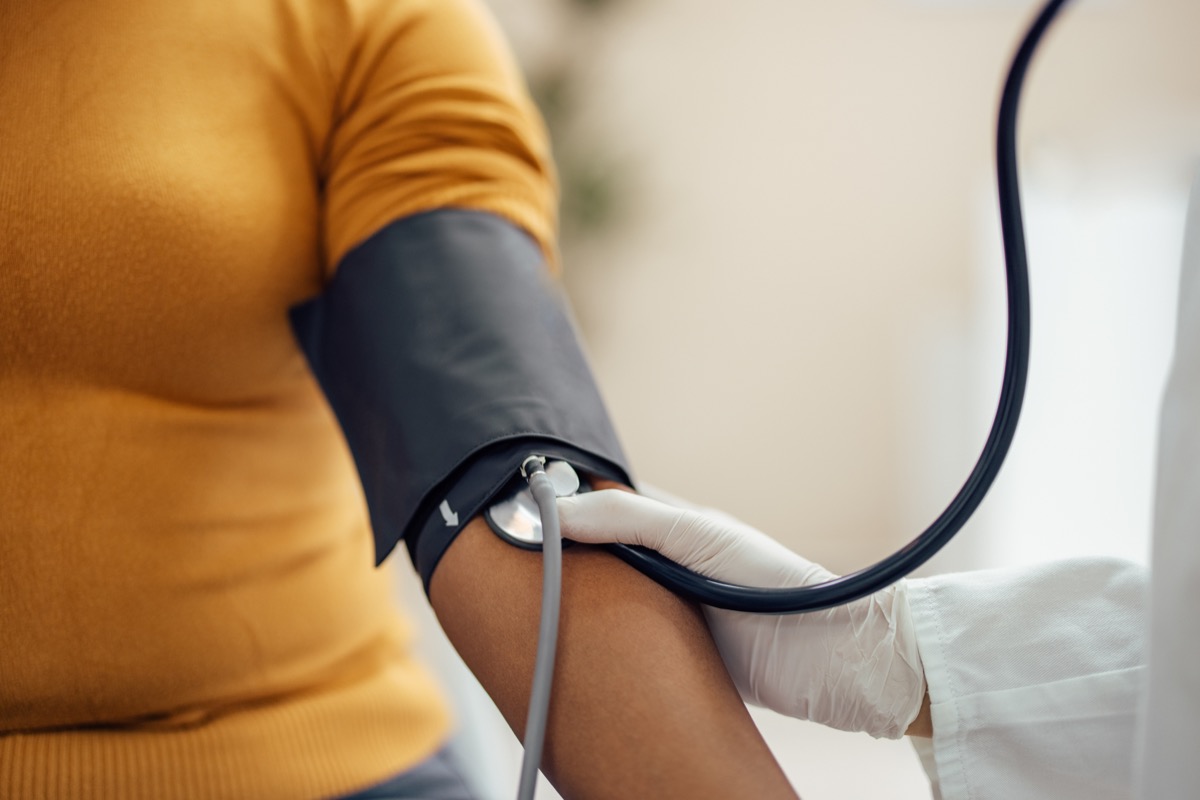7 Potassium Deficiency Symptoms, According to Doctors

Potassium is an essential mineral that’s used in every cell and tissue in your body. That’s why having hypokalemia, or a potassium deficiency, can cause such a wide range of symptoms.
“Potassium is an important ion involved in transmitting nerve signals, muscle contractions, fluid balance, and blood pressure, to name a few,” says Lauren DeDecker, MD, an internal medicine physician and popular medical content creator.
Because potassium helps to regulate muscle contractions, and the heart is a muscle, one of the mineral’s most important jobs is keeping our heartbeats regular. It’s also tasked with moving nutrients into your cells and removing cellular waste, serving an important role in metabolic function.
Doctors say you can usually get all the potassium you need through dietary sources. However, if you suspect your levels fall outside of a normal range, it’s important to discuss those concerns with a medical professional.
Wondering which symptoms might tip you off to a problem and get that conversation started? Read on to learn the top five potassium deficiency symptoms and how low levels could affect your health.
RELATED: 5 Fiber Deficiency Symptoms, Doctors Say.
Who is at the highest risk of potassium deficiency?

DeDecker notes that a true potassium deficiency is “not common in healthy, asymptomatic adults.”
However, Chris Mohr, PhD, RD, fitness and nutrition advisor at Fortune Recommends Health, asserts that potassium deficiencies can happen “if you don’t eat enough potassium-rich foods or if you lose too much potassium through urine, sweat, or digestive issues.”
“People with kidney disease, those taking certain diuretics, or who have disordered eating are at higher risk,” he notes.
Having a high alcohol intake can also negatively affect your potassium levels, says Olalekan Otulana, MBCHB, a UK-based general practitioner and addiction physician currently working with Ocean Recovery Centre.
“We frequently encounter and manage potassium deficiencies in our patients, one of the main contributors being excessive alcohol use,” Otulana tells Best Life.
In fact, a 2022 study published in the Journal of Clinical Medicine wrote that “hypokalemia occurs in almost 50 percent of patients with chronic alcohol consumption disorder.”
This can occur due to increased vomiting, dehydration, and poor nutrition. It also forces your kidneys to work hard at passing alcohol through your system, causing a loss of electrolytes—including potassium.
RELATED: Folate Deficiency: 5 Signs You’re Not Getting Enough Vitamin B9.
6 potassium deficiency symptoms
The only way to know for sure that you have a potassium deficiency is to undergo a blood test; it’s part of a basic metabolic panel (BMP).
In addition to potassium, this test measures seven other substances in your blood: glucose, calcium, sodium, carbon dioxide, chloride, creatinine, and blood urea nitrogen.
However, knowing the symptoms of a potassium deficiency may help you spot a problem and begin that conversation with your doctor. These are the top five symptoms to look out for.
1. Fatigue

Low potassium is often associated with fatigue since it can affect how your body processes and utilizes nutrients. However, it’s important to note that fatigue is a nonspecific symptom of hypokalemia, meaning it could have an extremely wide range of other possible underlying causes. Your doctor can help you determine the root cause.
2. Muscle weakness and cramps

DeDecker tells Best Life that muscle weakness is another possible sign of a potassium deficiency because, without adequate intake, your nerves and muscles cannot function at their optimal levels. In severe cases of potassium deficiency, patients may experience muscle cramps.
3. Heart arrhythmia

Heart arrhythmia, or having an irregular heartbeat, can also be a sign of a potassium deficiency. DeDecker notes this can be dangerous, so it’s important to mention it to your doctor if you notice this symptom.
“If not treated, arrhythmias can damage the heart, brain, or other organs. This can lead to life-threatening stroke, heart failure, or cardiac arrest,” the National Institutes of Health (NIH) notes.
One reason that it’s crucial to seek a professional opinion rather than attempting to treat this symptom at home with potassium supplements is that “excessively high blood levels of potassium can also be dangerous and cause heart arrhythmias,” DeDecker says.
In other words, you might have the same symptom regardless of whether your potassium levels are high or low, and you can worsen the problem by attempting to correct it without a doctor’s oversight.
4. Constipation and bloating

Digestive problems such as constipation and bloating are lesser-known symptoms of a potassium deficiency. According to Otulana, this occurs because “potassium aids smooth muscle function in the digestive tract, and low levels can slow bowel movements.”
5. Numbness and tingling

Otulana says some people with low potassium levels might also notice numbness or tingling, especially in the hands and feet, since “nerve function can be affected by low potassium.”
When this happens, it’s called peripheral neuropathy. Though oftentimes the condition is caused by things that are unrelated to an underlying illness, it’s still worth discussing with your doctor.
6. Breathing difficulties

Low potassium levels can also affect respiration by preventing the lungs from contracting properly. “In severe cases, muscle weakness from low potassium can affect the muscles used for breathing,” explains Otulana.
If you notice persistent shortness of breath for any reason, it’s important to seek immediate medical assistance.
7. Hypertension

Mohr notes that having a potassium deficiency can put you at greater risk of hypertension.
“Low potassium can elevate blood pressure, particularly because overconsumption of sodium is common and sodium and potassium work together like a seesaw,” he explains.
When you consume too much sodium and too little potassium, these two electrolytes that usually help your body maintain fluid and blood volume become imbalanced. Limiting your sodium intake and increasing your potassium intake are two ways to help lower your blood pressure.
Can you get too much potassium?

According to the U.S. Department of Agriculture (USDA), “4,700 milligrams (mg) is the recommended daily potassium intake of individuals aged 14 and up. But that group is only getting about half that amount.”
“Because the richest sources are fruits and vegetables and most people don’t meet the minimum recommendations, potassium is what is considered a ‘shortfall’ nutrient where most don’t meet the recommendations,” explains Mohr.
That said, lower levels are considered adequate intake (AI) by the NIH—meaning they ensure nutritional adequacy despite not reaching ideal levels. Most adult men receive an adequate intake when they get 3,400 mg of potassium daily, and most adult women receive an adequate intake when they get 2,600 mg of the mineral daily. Your exact needs may vary based on age, gender, and overall health.
DeDecker notes that more isn’t always better: You can experience adverse effects from potassium levels being too low or too high, especially if you have certain chronic medical conditions.
“Kidneys help maintain potassium balance. People with advanced kidney disease may be asked to limit their potassium intake to prevent excessive blood levels,” she offers as an example.
Dietary sources of potassium

Typically, when people think of dietary sources of potassium, they think of bananas in particular. However, there are plenty of other plant-based sources of potassium to explore. These include apricots, avocados, apples, oranges, spinach, kale, tomatoes, cucumbers, zucchini, eggplant, pumpkin, carrots, sweet potatoes, potatoes, and lentils, DeDecker says.
Meat, fish, and dairy products also provide potassium to varying degrees. For instance, according to the USDA’s Dietary Guidelines, a standard three-ounce serving of salmon may contain up to 535 mg of potassium, while an eight-ounce serving of plain, nonfat yogurt typically contains 625 mg of the mineral.